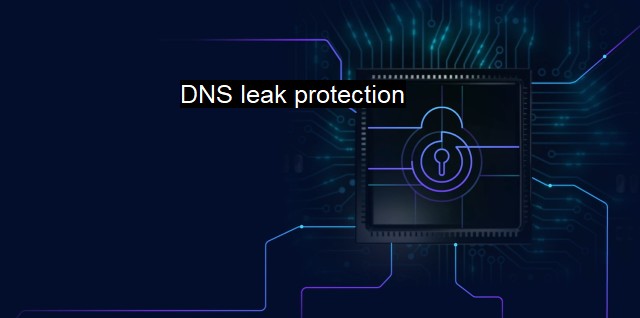What is DNS leak protection?
Ensuring Online Privacy: Exploring the Benefits and Techniques of DNS Leak Protection for Safeguarding Cybersecurity
DNS leak protection is of paramount importance. 'DNS' stands for Domain Name System, the method by which the names of websites (like alibaba.com or google.com) that users input into their browser are translated into numeric Internet Protocol (IP) addresses that computers can understand in order to connect the user to that specific website.Just as you might have leaky pipes in your home that can lead to spills, similarly, ‘DNS leaks’ can occur, gushing out private information, which can then be accessed by internet service providers (ISPs), hackers, or other malicious entities. Circumstances like this emphasize the importance of DNS leak protection.
To comprehend DNS leak protection, we first need to understand the basics of DNS requests. These requests occur when a device sends a query to a DNS server to translate a domain name into an IP address. Typically, these requests are directed through the Internet Service Provider (ISP) by default. The issue arises when these queries start being directed outside the virtual private network (VPN). A DNS leak happens exactly when your device, even when connected to a VPN, forwards the DNS requests to your ISP, rather than through the VPN tunnel.
Unfortunately, this costs you your anonymity because DNS queries involve details about the websites you visit; therefore, a DNS leak essentially opens you up to scrutiny. Your browsing history can now be seen, and that forms the crux of the privacy issue associated with DNS leaks.
In the context of laptops or computers, a DNS leak implies that the activities executed by an entity on their device are evident and can be traced back. In the worst-case scenarios, DNS leaks can pave the way for severe problems like unauthorized surveillance, throttling by ISPs, targeted ads based on browsing history, and them ultimately being the victim of specified cyber-attacks.
Being systems-level failures, DNS leaks can occur due to reasons that are often outside the purview of antivirus software. These can range from being rooted in the flaws of the operating system, how specific networking-related tasks are being handled, or even from certain VPN services not being correctly configured.
The solution to avoid DNS leak is by enabling DNS leak protection. Irrespective of the cause for the DNS leak, there are specific effective measures for protection against DNS leaks, and they fundamentally revolve around the VPN you're using. DNS Leak Protection ensures that all DNS queries utilize a secure pathway and are directed via an anonymous pathway instead of the ISP.
Worthy VPN services take this pretty seriously and incorporate DNS Leak Protection as a part of their offerings with features such as custom DNS servers and settings for controlling DNS traffic. With this feature, VPN clients force all DNS queries to be routed through the VPN server, providing a robust shield against DNS leaks.
DNS leak testing tools serve as another measure of protection against DNS leaks. A user can quickly run these simple online tests to determine whether the personal data is securely tucked away or is susceptible to threat actors.
In this era of relentless cyber threats where digital interactions serve as the crux of several operations, defending privacy is not merely desirable but a virtue that we must embrace. DNS leak protection caters to this evolving need by offering a line of defense to fortify internet interactions. As cybersecurity evolves, the need for broader awareness about DNS leaks and their implications on privacy and security are crucial. The first step to securing one's digital footprint begins with understanding the problem, and doing so empowers individuals to protect themselves against DNS leaks effectively.

DNS leak protection FAQs
What is DNS leak protection?
DNS leak protection is a security feature that prevents internet service providers or other third parties from accessing your browsing history by encrypting your DNS requests.How does DNS leak protection work?
DNS leak protection works by routing all your DNS requests through a secure encrypted tunnel that masks your IP address and prevents your internet service provider or other third parties from tracking your online activities.Why is DNS leak protection important for cybersecurity?
DNS leak protection is important for cybersecurity because it helps prevent unauthorized access to your browsing history and other online activities. This can help protect your personal information and sensitive data from cybercriminals who may try to use this information to steal your identity or commit other types of fraud.Do I need antivirus software if I have DNS leak protection?
DNS leak protection is an important security feature, but it should not be relied on as the only form of cybersecurity. Antivirus software is still necessary for protecting your computer from malware, viruses, and other types of cyber threats. It is recommended to use both DNS leak protection and antivirus software for optimal online protection.| | A | | | B | | | C | | | D | | | E | | | F | | | G | | | H | | | I | | | J | | | K | | | L | | | M | |
| | N | | | O | | | P | | | Q | | | R | | | S | | | T | | | U | | | V | | | W | | | X | | | Y | | | Z | |
| | 1 | | | 2 | | | 3 | | | 4 | | | 7 | | | 8 | | |||||||